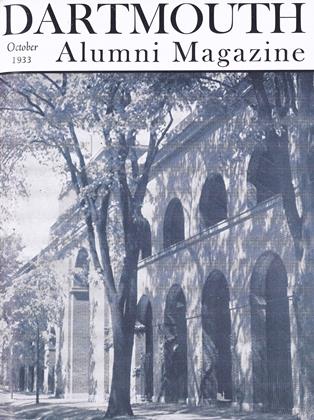Addressing a Commencement throng in Rollins Chapel, Sunday, June 18, President Hopkins concluded his Baccalaureate with the traditional valedictory to the seniors. As the President saluted the class with the words "Men of 1933," the seniors rose and heard this farewell:
Having made attempt to state the religious faith that is in us, the privilege remains for me to say a personal word to you in behalf of the College. This is spoken in high regard and in genuine affection and with the sense of imminent loss which each year pervades us who remain, as we consider the graduation of the senior class.
These are days in our common lives when for most of us emotions refuse to stay imprisoned. The unfamiliarity of familiar things begins to appear, and strange longings seize us to express thoughts that are by very nature inexpressible. We may or we may not feel like agreeing with the sentiments bespoken in behalf of Dartmouth more than a century and a half ago by that courtly cavalier, Governor John Wentworth, himself a son of Harvard. This College is, he wrote, "the most noble, useful, and truly pious foundation now in America." There is no point for us today to indulge in comparisons. We can at least say, what is very much, that here rich opportunities have been available to gain knowledge, that increased sensitiveness to the majesty of nature has been almost inevitable, and that in a closely compact community such as that in which we have dwelt, friendships of particular intimacy have been possible.
If we turn to the outside world, as it is imperative that we should now do, one of the most obvious things for us to observe in the history of the last few years is the futility that has attached to impressionistic prophecy. A critic has written. "The American has so religiously fixed his eyes upon the future that he is incapable of looking after his present." What specific opportunities are to be yours in days to come, no man can tell. As truly, no man can doubt that the future will reveal opportunities. Your situation in life on graduation will perhaps be most analogous to that of contingent troops in war, trained and ready for any emergency which may arise, but whose eventual service may be destined to be on a front little suspected in the original plans.
Dr. Osier, in the midst of his great career, used to say that his whole philosophy of life was determined by a passage from Carlyle, upon which his eye happened entirely by chance in a period of great personal anxiety in his youth. It read: "Our main business is not to see what lies dimly at a distance, but to do what lies clearly at hand." He said that from that time he deliberately adopted living in "day-tight compartments" as a way of life, doing the things at hand without disturbance of mind in regard to the past and without anxious thought in regard to the future.
In greeting you as the alumni you are about to become, I believe that there is no better message which the College can extend than to impose the injunction upon you that in the uncertainties into which you will inevitably be plunged, you concern yourself essentially day by day with those problems which lie closely at hand. Thus may condition be maintained for a future later to be revealed.
 View Full Issue
View Full Issue
More From This Issue
-
 Article
ArticleHANOVER BROWSING
October 1933 By Rees H. Bowen -
 Article
ArticleNEW COLLEGE RESPONSIBILITIES
October 1933 By Ernest Martin Hopkins -
 Class Notes
Class NotesClass of 1930
October 1933 By Albert I. Dickerson -
 Article
ArticlePRESIDENT'S ADDRESS TO THE ALUMNI
October 1933 -
 Article
ArticleARE WE GOING TO WIN?
October 1933 By Pat Holbrook '20 -
 Class Notes
Class NotesClass of 1910
October 1933 By Harold P. Hinman







